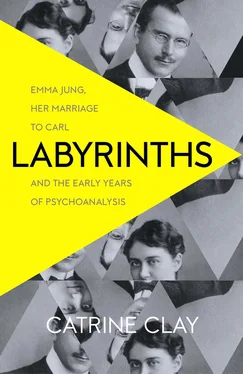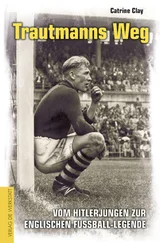Who knows what Freud made of Jung’s repeated use of the first-person pronoun, as though he were coming on his own, but he must have understood because when he arrived at the Grand Hotel that March morning, Freud was bearing some flowers for Frau Doktor Jung. As he presented them to her, with a formal bow, Emma saw a small dapper man with a neatly clipped moustache and beard, dressed in his winter best: a worsted overcoat in the English style; a suit, waistcoat, floppy bow tie, homburg hat, spats over boots, and a cane. His hair, inclined to be unruly, was combed down with his usual pomade supplied by the local barber he frequented every morning.
Originally the Jungs were meant to visit over Easter when Professor Freud had time to spare, but this was not possible for Carl and Emma who always spent Easter with their children. This presented a problem for Freud, who worked from eight in the morning till eight at night, apart from a break for the midday meal followed by a walk round the district for some air and a visit to the cigar shop. Unlike Carl Jung, Freud had not married into money and had to earn a living to support his large and extended family. ‘But Sundays I am free, so I must ask you to arrange your visit to Vienna in such a way as to have a Sunday available for me,’ he had written to Jung on 21 February. ‘If possible I would like to introduce you to a small circle of followers on a Wednesday evening. I further assume you will be willing to forgo the theatre on the few evenings you will be spending in Vienna, and instead to dine with me and my family and spend the rest of the evening with me. I am looking forward to your acceptance and the announcement of your arrival.’ Forgo the theatre? Jung had absolutely no intention of going. He hated the theatre. That was what Ludwig Binswanger was there for, to chaperone and entertain Emma. He himself wanted to spend every available minute with the Herr Professor.
As the four of them walked along, Freud smoking his third or fourth cigar of the day, the conversation remained on the formal level: the journey, the weather, their hotel accommodation – polite talk, just filling in. They must have made a comic sight – the two men who would become the two giants of psychoanalysis, walking side by side: Jung over six foot, Freud five foot seven, and Jung already talking his head off, loudly, as he always did.
Berggasse may have been only a short walk from the Ringstrasse, but it was far enough to leave the grandeur of the Ring district behind and enter the more modest, cobbled streets surrounding Vienna University. And it was long enough for a small misunderstanding to occur, seemingly insignificant at the time, but in hindsight very significant indeed. Freud, trying to put the visitors at their ease, joked that he was happy to be receiving them as guests to his home, but warned that it was a very modest place and had little to offer, just his alte (old woman) – nothing much else. Emma was shocked. So was Carl. What a way to talk about your wife, the mother of your children! Swiss haute bourgeoisie as they were, Freud’s self-deprecating Jewish humour was completely lost on them. Emma, usually blessed with a healthy sense of fun, was puzzled.
Frau Professor Freud was there to greet the guests from Zürich as they mounted the stone steps of 19 Berggasse, and then up the stairs to the apartment. Emma, shaking Martha Freud formally by the hand – ‘ guten Tag, guten Tag ’ – observed an older woman in a long-skirted, high-necked Sunday dress, stylish in its way, with a simple brooch at the neck, her dark hair pinned up neatly with combs. Behind her stood a younger woman, Martha’s unmarried younger sister Minna who lived with them – an interesting set-up which caused plenty of gossip and speculation over the years. Herr Professor Freud and his two women. Apparently Minna sometimes answered the telephone calling herself ‘Frau Professor’! Freud himself did not like the newfangled telephone and always left it to one of the women of the house to answer. In 1907 Sigmund Freud was fifty-one, Martha forty-six. They had been married for twenty-one years and had six children ranging from Mathilde twenty, Martin eighteen, Ernst sixteen, Oliver fifteen, Sophie fourteen, down to Anna, twelve. Freud called them his ‘rabble’ and his ‘rascals’ with affection and some pride.
Martha, greeting Emma Jung, observed a formal, reticent young woman, dressed with an understated style, and only a few years older than her daughter Mathilde. She already knew about the Frau Doktor’s wealth. Everyone knew. But what she could not fail to notice was that Frau Doktor Jung did not act wealthy. As the two women exchanged greetings, Jung was shaking hands in the formal Swiss way. No fancy Viennese kissing of ladies’ hands for Carl.
On special occasions such as this Martha would cook a chicken for the midday meal, though her husband was not keen. ‘Let them live,’ he always said. ‘Let them lay eggs.’ But his wife made all the household decisions, it had been that way from the start: he earned the money, she ran the house. It suited them both and Freud never interfered and never complained. So there they sat, twelve of them, round the dinner table having their meal, served from the kitchen by the maid, with the men at one end and the women and children at the other. Emma was surprised by all the talk – the Freud children expressed themselves easily and cheerfully. ‘Our upbringing might be called liberal,’ Martin Freud later wrote, reflecting on his ‘gay and generous’ father. ‘We were never ordered to do this, or not to do that; we were never told not to ask questions.’ For their part, Martha and Minna, the two sisters, could not fail to notice that the Jungs both had strong Swiss accents, making them seem more provincial than they were. Apparently, Frau Doktor Jung had wanted to attend Zürich University to study the natural sciences but her father wouldn’t let her. Understandably. The only women who attended university were rich foreigners – Russians and the like.
Looking back, Martin Freud, as an observant eighteen-year-old, remembers Herr Doktor Jung having a ‘commanding presence’: ‘He was very tall and broad-shouldered, holding himself more like a soldier than a man of science and medicine. His head was purely Teutonic with a strong chin, a small moustache, blue eyes, and thin closely cropped hair.’ In fact, Jung’s eyes were brown not blue, but in the almost entirely Jewish environment inhabited by the Freud family the Teutonic aspect was unusual and rather interesting. Still, Martin took a dislike to Jung: ‘He never made the slightest attempt to make polite conversation with mother or us children but pursued the debate which had been interrupted by the call to luncheon. Jung on these occasions did all the talking and father with unconcealed delight did all the listening,’ he wrote, still irked by the memory. Martin was doubly surprised because normally his father strongly disapproved of visitors ignoring his family and he would deliberately change the conversation to include them, making it clear that this was not how things went in the Freud household. But not with Herr Doktor Jung, who talked throughout the meal exclusively to his father, showing no awareness of or concern for anyone else. Emma might have told them this was typical of her husband, who had gained some enemies amongst his colleagues at the Burghölzli asylum because of it, though never amongst his patients who all revered him.
After the meal there was coffee and then Emma and Binswanger took their leave, as arranged, so Carl could spend more time with Freud. The two men swiftly retired to Freud’s consulting rooms on the mezzanine floor below, which looked out over a small garden with a single chestnut tree. They talked for thirteen hours without a break. It was love at first sight, a mutual enchantment accompanied by every high hope. Freud had read this brilliant young doctor’s papers on dementia praecox – or ‘schizophrenia’ as Bleuler of the Burghölzli asylum had coined it – as well as Jung’s ‘Experiments in Word Association’, and now, to his delight, he found that the man in conversation was as brilliant and challenging as the writer on the page.
Читать дальше












